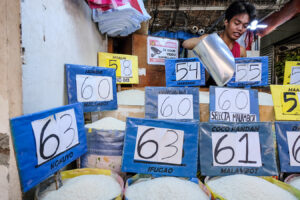BSP sees 3.4-4.2% inflation for March

Paco Market, March 13, 2024. — PHILIPPINE STAR/RYAN BALDEMOR
By Luisa Maria Jacinta C. Jocson, Reporter
HEADLINE INFLATION likely further accelerated in March and might have even breached the target for the first time in three months, the Bangko Sentral ng Pilipinas (BSP) said.
Inflation likely settled within 3.4% to 4.2%, the central bank said in a statement on Monday.
The upper end of the BSP’s forecast could have exceeded the 2-4% target for the first time in three months.
The lower end of the forecast would be unchanged from 3.4% in February.
Year on year, inflation would be slower than 7.6% a year earlier.
A BusinessWorld poll of 17 analysts yielded a median estimate of 3.8% for March inflation, within the BSP’s forecast.
“Continued price increases of rice and meat along with higher domestic oil prices and electricity rates are the primary sources of upward price pressures for the month,” the BSP said.
Latest data from the Agriculture department showed that the average retail price of a kilo of local well-milled rice ranged from P49 to P55 as of March 27, higher than P39 to P46 average a year ago. A kilo of regular milled rice costs P50, higher than the P34 to P40 a year ago.
Manila Electric Co. (Meralco) raised the rate for a typical household by P0.0229 to P11.9397 per kilowatt-hour (kWh) in March due to the higher transmission charge.
Fuel prices continued to rise in March. Pump price adjustments stood at a net increase of P2.30 a liter for gasoline and P0.65 a liter each for diesel and kerosene.
“Meanwhile, lower prices of fruits, vegetables and fish along with the peso appreciation could contribute to downward price pressures,” the BSP said.
The local statistics authority is set to release March inflation data on April 5.
Ruben Carlo O. Asuncion, chief economist at Union Bank of the Philippines, Inc. said inflation might continue to breach the target in the coming months.
“We anticipate headline inflation to surge past 4% year on year starting in March with a hefty contribution from the rice consumer price index (CPI) and latent drought effects on the prices of the other crops, with the worst-case scenario of nearly 5%,” he said in an e-mail.
In February, rice inflation surged to 23.7%, the fastest since 24.6% in February 2009.
Mr. Asuncion said his estimates show that inflation could peak at 5% in May.
Colegio de San Juan de Letran Graduate School Associate Professor Emmanuel J. Lopez in an e-mail said inflation could accelerate in March amid elevated petroleum prices and effects from the El Niño dry spell.
An uptick in inflation could prompt the central bank to keep rates higher for longer.
“As mentioned by the BSP, Finance Secretary Ralph G. Recto, and even the President himself, the central bank will likely take its time before loosening the monetary reins,” Aris D. Dacanay, HSBC economist for ASEAN (Association of Southeast Asian Nations), said in an e-mail.
“Inflation risks are still too tilted to the upside while strong growth grants the central bank the luxury to keep its policy rate high for longer,” he added.
President Ferdinand R. Marcos, Jr. earlier this month said inflation is still the country’s biggest problem and that it might be too soon to cut rates.
To tame inflation, the BSP kept its benchmark rate steady at a near 17-year high of 6.5% for a third-straight meeting in February. It raised borrowing costs by 450 basis points (bps) from May 2022 to October 2023.
The Monetary Board will hold its next policy review on April 8.




